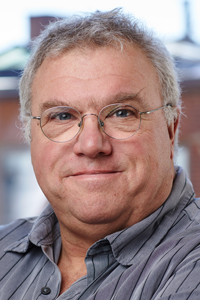
Peter Cariani
Position
Associate Professor
Affiliated Departments
Telephone
617-747-6561
Personal Websites
For media inquiries, please contact Media Relations
Peter Cariani is an intellectual, research scientist, and teacher. His research in auditory and theoretical neuroscience involves temporal codes and computations for pitch and rhythm, with other publications on cybernetics, biosemiotics, anesthesia and neural coding, emergence and creativity, and radical constructivism. Cariani has taught courses on the neuropsychology of music at Tufts, Massachusetts Institute of Technology, Harvard University, and Boston Conservatory; auditory neuroscience at Boston University; and consciousness studies at Boston Conservatory.
Career Highlights
Publications include the following:
- Cariani, P., and Delgutte, B. (1996). Neural correlates of the pitch of complex tones. I. Pitch and pitch salience. II. Pitch shift, pitch ambiguity, phase-invariance, pitch circularity, and the dominance region for pitch. Journal of Neurophysiology, 76(3), 1698–1734.
- Cariani, P. (1999). Temporal coding of periodicity pitch in the auditory system: an overview. Neural Plast, 6(4), 147–172.
- Cariani, P. (2002). Temporal codes, timing nets, and music perception. Journal of New Music Research, 30(2), 107–136.
- Cariani, P. (2012). Creating new primitives in minds and machines. In J. McCormack and M. D'Inverno (Eds.), Computers and Creativity (pp. 395–430). New York: Springer.
- Cariani, P. (2015). Sign functions in natural and artificial systems. In P. P. Trifonas (Ed.), International Handbook of Semiotics (pp. 917–950). Dordrecht: Springer.
- Cariani, P. (in press, 2018). Musical intervals, scales and tunings: auditory representations and neural codes. In P. J. Rentfrow and D. J. Levitin (Eds.), Foundations in Music Psychology (pp. 52). Cambridge, MA: MIT Press.
In Their Own Words
